八年级英语上册(外研版)教案 Module.5 Unit3【快乐学案】
外研版英语八年级上册Module 3《Sports》全单元教学设计

外研版英语八年级上册Module 3《Sports》全单元教学设计一. 教材分析《Sports》是外研版英语八年级上册Module 3的主题单元,主要介绍体育运动的相关知识。
本单元包括介绍运动项目的短文、运动器材的词汇、以及关于运动的句子。
教材内容丰富,贴近学生生活,有利于激发学生的学习兴趣。
二. 学情分析八年级的学生对体育运动有较高的兴趣,生活中也经常参与各种运动。
但部分学生在英语表达方面仍有困难,需要教师关注并提供个别辅导。
此外,学生们的团队合作意识和运动知识水平不同,需要在教学过程中加以考虑。
三. 教学目标1.知识目标:学生能掌握本单元的运动项目名称、运动器材词汇以及相关句子。
2.能力目标:学生能运用所学知识进行简单的英语交流,如谈论喜欢的运动、介绍运动项目等。
3.情感目标:培养学生积极参与运动的意识,提高团队合作精神。
四. 教学重难点1.重点:运动项目名称、运动器材词汇以及相关句子的掌握。
2.难点:运动项目名称和运动器材词汇的准确运用,以及句子结构的灵活运用。
五. 教学方法采用任务型教学法、情境教学法和分组合作教学法。
通过设定各种运动情境,引导学生进行英语交流,提高学生的实际运用能力。
同时,分组合作完成任务,培养学生的团队合作意识。
六. 教学准备1.准备运动项目的图片、视频等教学资源。
2.准备运动器材的实物或图片。
3.准备相关句子结构的模板。
七. 教学过程1.导入(5分钟)利用图片或视频展示各种运动项目,引导学生谈论自己喜欢的运动。
同时,询问学生对运动项目的了解,为新课的学习营造轻松的氛围。
2.呈现(10分钟)教师展示运动项目的图片,引导学生用英语说出运动项目的名称。
接着,呈现运动器材的实物或图片,让学生用英语表达。
在此过程中,教师给予鼓励和指导,帮助学生克服恐惧心理。
3.操练(10分钟)教师设立各种运动情境,如篮球比赛、足球比赛等,引导学生运用所学知识进行英语交流。
同时,鼓励学生大胆开口,提高口语表达能力。
外研版英语八年级上册《Module 5 Lao She Teahouse,Unit 3》教学设计

外研版英语八年级上册《Module 5 Lao She Teahouse,Unit 3》教学设计一. 教材分析外研版英语八年级上册《Module 5 Lao She Teahouse, Unit 3》主要讲述了老舍茶馆的故事。
本节课主要让学生掌握一般过去时的用法,学会描述过去发生的事情。
通过本节课的学习,学生能够运用一般过去时描述自己的经历和感受。
教材内容丰富,插图生动有趣,激发了学生学习的兴趣。
二. 学情分析八年级的学生已经掌握了英语学习的基本语法和词汇,具备一定的听说读写能力。
但部分学生对一般过去时的用法还不够熟练,需要在本节课进一步巩固。
此外,学生对于描述过去发生的事情还有一定的困难,需要通过实例和练习来提高。
三. 教学目标1.知识目标:–掌握一般过去时的构成和用法。
–学会用一般过去时描述过去发生的事情。
2.能力目标:–能够听懂、会说、会读本节课的重点词汇和句子。
–能够运用一般过去时描述自己的经历和感受。
3.情感目标:–培养学生对英语学习的兴趣和热情。
–培养学生团结合作、积极进取的精神风貌。
四. 教学重难点•一般过去时的构成和用法。
•描述过去发生的事情的句子结构。
•一般过去时在具体语境中的运用。
•描述过去发生的事情时的时间状语。
五. 教学方法1.情境教学法:通过设定情境,让学生在实际语境中运用所学知识。
2.任务型教学法:通过完成任务,培养学生运用英语进行交际的能力。
3.小组合作学习:鼓励学生相互讨论、合作,提高学习效果。
六. 教学准备1.教材和教辅资料。
2.多媒体教学设备。
3.图片、卡片等教学辅助工具。
七. 教学过程1.导入(5分钟)利用多媒体展示老舍茶馆的图片,引导学生谈论茶馆的情景。
然后询问学生:“你们有没有去过茶馆?”,让学生用英语表达自己的经历。
2.呈现(10分钟)教师通过展示教材图片,引导学生说出本节课的主要内容。
然后板书一般过去时的构成,并解释其用法。
3.操练(15分钟)学生分组进行角色扮演,模拟去茶馆的场景,运用一般过去时描述自己的经历。
外研版八年级上Module5Unit3教学案
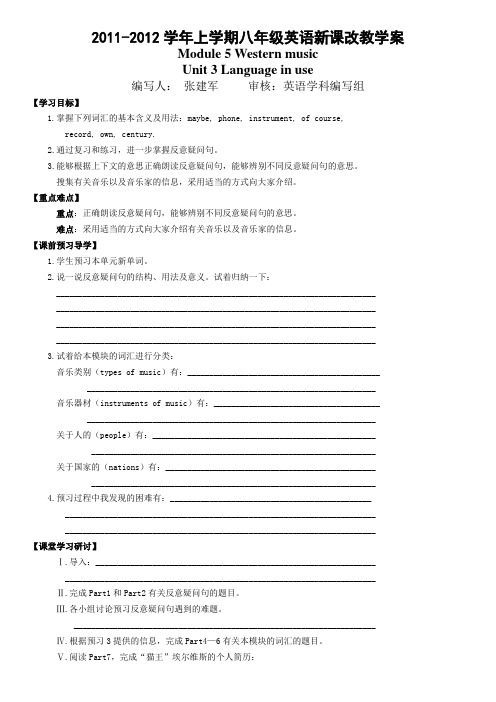
2011-2012学年上学期八年级英语新课改教学案Module 5 Western musicUnit 3 Language in use编写人:张建军审核:英语学科编写组【学习目标】1.掌握下列词汇的基本含义及用法:maybe, phone, instrument, of course,record, own, century.2.通过复习和练习,进一步掌握反意疑问句。
3.能够根据上下文的意思正确朗读反意疑问句,能够辨别不同反意疑问句的意思。
搜集有关音乐以及音乐家的信息,采用适当的方式向大家介绍。
【重点难点】重点:正确朗读反意疑问句,能够辨别不同反意疑问句的意思。
难点:采用适当的方式向大家介绍有关音乐以及音乐家的信息。
【课前预习导学】1.学生预习本单元新单词。
2.说一说反意疑问句的结构、用法及意义。
试着归纳一下:_________________________________________________________________________ ___________________________________________________________________________________________________________________________________________________________________________________________________________________________3.试着给本模块的词汇进行分类:音乐类别(types of music)有:____________________________________________ __________________________________________________________________ 音乐器材(instruments of music)有:______________________________________ __________________________________________________________________ 关于人的(people)有:____________________________________________________________________________________________________________________关于国家的(nations)有:_________________________________________________________________________________________________________________4.预习过程中我发现的困难有:____________________________________________________________________________________________________________________________________________________________________________________________【课堂学习研讨】Ⅰ.导入:_______________________________________________________________________________________________________________________________________ Ⅱ.完成Part1和Part2有关反意疑问句的题目。
外研版八年级英语上册教案M3Unit3教学设计
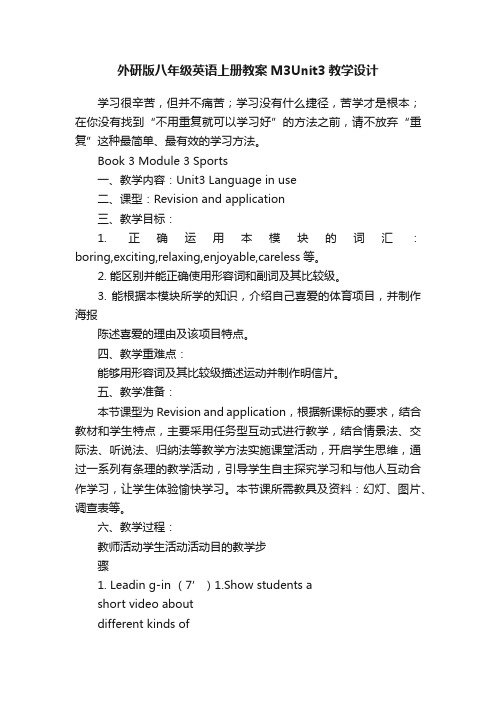
外研版八年级英语上册教案M3Unit3教学设计学习很辛苦,但并不痛苦;学习没有什么捷径,苦学才是根本;在你没有找到“不用重复就可以学习好”的方法之前,请不放弃“重复”这种最简单、最有效的学习方法。
Book 3 Module 3 Sports一、教学内容:Unit3 Language in use二、课型:Revision and application三、教学目标:1. 正确运用本模块的词汇:boring,exciting,relaxing,enjoyable,careless等。
2. 能区别并能正确使用形容词和副词及其比较级。
3. 能根据本模块所学的知识,介绍自己喜爱的体育项目,并制作海报陈述喜爱的理由及该项目特点。
四、教学重难点:能够用形容词及其比较级描述运动并制作明信片。
五、教学准备:本节课型为Revision and application,根据新课标的要求,结合教材和学生特点,主要采用任务型互动式进行教学,结合情景法、交际法、听说法、归纳法等教学方法实施课堂活动,开启学生思维,通过一系列有条理的教学活动,引导学生自主探究学习和与他人互动合作学习,让学生体验愉快学习。
本节课所需教具及资料:幻灯、图片、调查表等。
六、教学过程:教师活动学生活动活动目的教学步骤1. Leadin g-in (7’)1.Show students ashort video aboutdifferent kinds ofball games.2.Have a free talkwith students.What’s yourfavourite sport?Why?1.The students watchthe video and learn thedifferent kinds of ballgames.2. Answer the questionslike this : My favouritesport is ...Because it’s...通过观看关于各种球类运动的视频,让学生从视觉上直观地了解各项球类运动的同时也活跃了课堂气氛,为进一步的学习做好铺垫。
Module5Unit3课件八年级英语上册
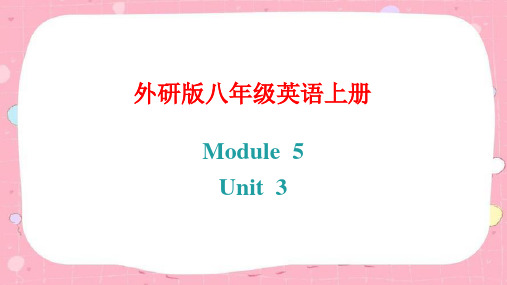
do”.(
)
2. I can talk to someone by using “want to do” ,“need to do” and “decide to
do”.(
)
3. I can ask my friends or my classmates something by using “teach sb. sth.”
book的A、B、C三个选项中,选出可以填
入空白处的最佳选项。
( A )1. I will be happy ______________ you come to my party.
A.if
B.or
C.and
( C )2. ______________ is here except Jack. I think he’s late again.
( B )1. A.work B.study C.drive D.hide
( A )2. A.young B.tall C.fat D.strong
( D )3. A.reading B.listening C.playing D.writing
( A )4. A.His B.Your C.My D.Her
in many films.
A.doctor
B.waiter
C.actor
( B )5. In China,riding shared bikes is very ______________. Many people like
外研版八年级英语上Module5 Unit3教案与反思精品

Module 5 Lao She Teahouse人非圣贤,孰能无过?过而能改,善莫大焉。
《左传》江缘学校陈思梅一、教学内容:Unit 3 Language in use二、课型:Revision and application三、教学目标:1. 正确运用本模块的词汇及短语2、掌握动词不定式作宾语的用法。
并能通过小组合作,把一部戏剧中的一幕改编成短剧并在班上表演。
四、教学重难点:掌握动词不定式作宾语的用法。
并能通过小组合作,把一部戏剧中的一幕改编成短剧并在班上表演。
五、教学准备:本节课型为Revision and application,根据新课标的要求,结合教材和学生特点,主要采用任务型互动式进行教学,结合情景法、交际法、听说法、归纳法等教学方法实施课堂活动,开启学生思维,通过一系列有条理的教学活动,引导学生自主探究学习和与他人互动合作学习,让学生体验愉快学习。
本节课所需教具及资料:幻灯、图片、调查表等。
六、教学过程:达标训练题一、单项选择。
()1. Let’s _________ for a walk, shall we?- ____________,A. to goB. goingC. goD. gone( ) 2. The boss made the workers ________ the job on time.A. finish finished C. finishes D. to finish( ) 3. It’s necessary for us __________ Mont Yuntai.A. go climbingB. go to climbC. to go climbingD. goes climbing( ) 4. - Mary, What’s that? - A card. Linda ______ it _______me yesterday.A. sent ; forB. sent ; toC. gives ; forD. gives; to ( ) 5. I decide ________ a translator in the future.A. beB. to beC. beingD. am二、阅读理解Most people make their living(谋生)with their hands, but Bob makes his living with his feet.Bob’s story began in a small city in England. His parents were poor. Seven people lived in a small house. Bob had no place to play but on the street.Bob’s father often played football. Little Bob wanted to play football, too. So his father made a soft (柔软的)ball for him to kick. It was a sock full of old cloth. He kicked it every day.At last , Bob learned to kick a real football. And after a few years he could play football very well.根据短文内容,选择最佳答案。
外研版英语八年级上册Module 5《Lao She’s Teahouse》(Unit 1)教学设计

外研版英语八年级上册Module 5《Lao She’s Teahouse》(Unit 1)教学设计一. 教材分析《Lao She’s Teahouse》是人教版初中英语八年级上册Module 5的教学内容。
本节课主要介绍老舍的著作《茶馆》,通过学习这篇课文,学生可以了解到中国近代史上不同阶层的人物的生活状态,以及他们对待生活的态度。
教材内容丰富,涉及词汇、语法、阅读理解等多个方面,有利于提高学生的综合语言运用能力。
二. 学情分析初中八年级的学生已经具备了一定的英语基础,能够运用英语进行简单的交流。
但他们在阅读理解、词汇积累以及语法运用方面还存在一定的困难。
因此,在教学过程中,需要关注学生的个体差异,合理安排教学内容,调动学生的学习积极性,提高他们的阅读理解能力和语言运用能力。
三. 教学目标1.知识目标:学生能够掌握本节课的重点词汇和短语,如“drama, character, actor, actress, modern”等;学生能够理解课文内容,了解《茶馆》的故事背景和人物关系;学生能够运用所学的词汇和语法知识,进行简单的阅读理解和口语表达。
2.能力目标:学生能够提高阅读理解能力,通过阅读课文,获取和处理信息;学生能够在日常生活中运用所学的英语知识进行交流。
3.情感目标:学生能够培养对英语学习的兴趣,增强自信心;学生能够理解课文中所反映的社会现象,培养正确的人生观和价值观。
四. 教学重难点课文内容的理解;重点词汇和短语的掌握;运用所学的词汇和语法知识进行阅读理解和口语表达。
课文中长难句的理解;词汇的灵活运用;语法知识的运用。
五. 教学方法1.任务型教学法:通过设置各种任务,让学生在完成任务的过程中,运用所学知识,提高语言运用能力;2.情境教学法:创设各种情境,让学生在真实的语境中学习英语,提高学习兴趣;3.小组合作学习:鼓励学生相互合作,共同完成学习任务,培养团队精神;4.反馈与评价:及时给予学生反馈,鼓励他们积极参与学习,提高自信心。
外研版英语八年级上册Module 5《Lao She’s Teahouse》(Unit 2)教学设计
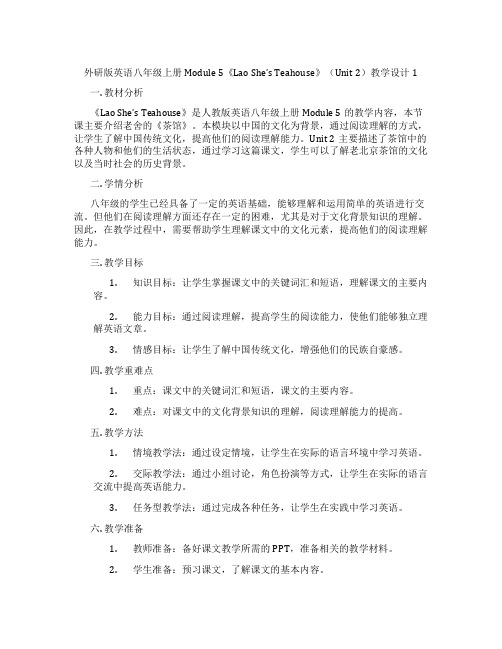
外研版英语八年级上册Module 5《Lao She’s Teahouse》(Unit 2)教学设计1一. 教材分析《Lao She’s Teahouse》是人教版英语八年级上册Module 5的教学内容,本节课主要介绍老舍的《茶馆》。
本模块以中国的文化为背景,通过阅读理解的方式,让学生了解中国传统文化,提高他们的阅读理解能力。
Unit 2主要描述了茶馆中的各种人物和他们的生活状态,通过学习这篇课文,学生可以了解老北京茶馆的文化以及当时社会的历史背景。
二. 学情分析八年级的学生已经具备了一定的英语基础,能够理解和运用简单的英语进行交流。
但他们在阅读理解方面还存在一定的困难,尤其是对于文化背景知识的理解。
因此,在教学过程中,需要帮助学生理解课文中的文化元素,提高他们的阅读理解能力。
三. 教学目标1.知识目标:让学生掌握课文中的关键词汇和短语,理解课文的主要内容。
2.能力目标:通过阅读理解,提高学生的阅读能力,使他们能够独立理解英语文章。
3.情感目标:让学生了解中国传统文化,增强他们的民族自豪感。
四. 教学重难点1.重点:课文中的关键词汇和短语,课文的主要内容。
2.难点:对课文中的文化背景知识的理解,阅读理解能力的提高。
五. 教学方法1.情境教学法:通过设定情境,让学生在实际的语言环境中学习英语。
2.交际教学法:通过小组讨论,角色扮演等方式,让学生在实际的语言交流中提高英语能力。
3.任务型教学法:通过完成各种任务,让学生在实践中学习英语。
六. 教学准备1.教师准备:备好课文教学所需的PPT,准备相关的教学材料。
2.学生准备:预习课文,了解课文的基本内容。
七. 教学过程1.导入(5分钟)通过展示老北京的茶馆图片,引导学生谈论他们对茶馆的了解,激发他们的学习兴趣。
2.呈现(10分钟)教师通过PPT呈现课文的主要内容,让学生初步理解课文。
3.操练(15分钟)学生分角色朗读课文,模仿课文中的人物说话,提高他们的语言表达能力。
外研版英语八年级上册Module5《LaoShe’sTeahouse》(Unit2)说课稿

外研版英语八年级上册Module 5《Lao She’s Teahouse》(Unit 2)说课稿一. 教材分析《Lao She’s Teahouse》是人教版英语八年级上册Module 5的教学内容,本节课主要通过老舍的《茶馆》这篇经典文学作品,让学生了解中国传统文化,提高学生的英语阅读能力。
本节课主要围绕着茶馆里的三个角色——王利发、刘麻子和崔久峰的故事展开,通过他们的故事,让学生了解中国近代历史和社会变迁。
二. 学情分析八年级的学生已经具备了一定的英语基础,能够进行简单的英语阅读和听说活动。
但同时,他们对于中国的传统文化和社会历史了解还不够深入,因此,在教学过程中,需要帮助学生建立起文化背景知识,提高他们的阅读理解能力。
三. 说教学目标1.知识目标:学生能够掌握课文中的关键词汇和句型,理解课文的大意。
2.能力目标:学生能够运用所学的词汇和句型进行口语表达和写作。
3.情感目标:通过学习课文,学生能够了解中国传统文化,增强民族自豪感。
四. 说教学重难点1.教学重点:课文中的关键词汇和句型,以及对中国传统文化的理解。
2.教学难点:课文中的一些历史背景和文化细节,以及如何运用所学进行口语表达和写作。
五. 说教学方法与手段1.教学方法:采用任务型教学法,让学生在完成任务的过程中,掌握课文内容,提高口语表达能力。
2.教学手段:利用多媒体课件,图片,视频等辅助教学,帮助学生更好地理解课文内容。
六. 说教学过程1.导入:通过展示茶馆的图片,引导学生谈论茶馆文化,激发学生的学习兴趣。
2.阅读理解:学生自主阅读课文,回答相关问题,教师进行讲解和指导。
3.口语表达:学生分组进行角色扮演,模仿课文中的对话,进行口语练习。
4.写作练习:学生根据课文内容,写一篇关于茶馆的小短文。
5.总结:教师对本节课的内容进行总结,强调重点和难点。
七. 说板书设计板书设计主要包括课文标题《Lao She’s Teahouse》,主要角色和他们的故事概要,以及一些关键词汇和句型。
外研英语八年级上册Module 5Unit3(共23张PPT)
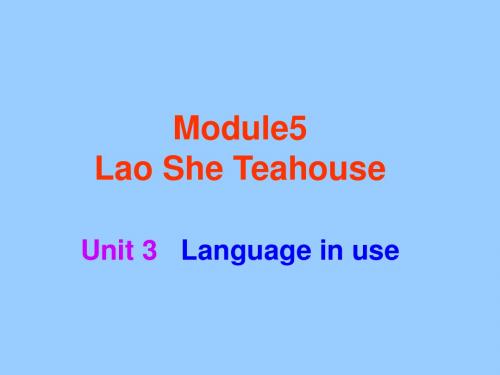
二、动词不定式作表语
1. 动词不定式放在谓语动词be后面就是作表语。 e.g. (1) Our duty is to study hard for the people. 连系动词 作表语 (2) Her wish is to become a teacher. 她的愿望是成为一名教师。(作表语) 所以不定式作表语的结构是: 谓语动词be+ to do (即系表结构) (3)The most important thing is to practise speaking English as often as possible. 最重要的事是尽可能经常练习讲英语。
五. 动词不定式用作定语。
不定式有形容词的作用,在句子中作定语, 修饰名词或者代词。动词不定式放在所修 饰的名词或者代词之后。表示“…要(做 某事)”“…的” • 我有许多家务要做。
I have lots of housework to do.
• 你想要点吃的东西吗?(放在代词之后) • 切记:用作定语的动词不定式一定要放
I have no time to go there.
2.不定式与其所修饰的词构成逻辑上的动宾 关系,而该不定式为不及物动词时,其后 须加上适当的介词,构成及物动词短语。 如:
• I am looking for a room to live in.
我正在找一间屋子住。
• I need a piece of paper to write on. 我需 要一张写字用的纸。
初二英语(外研版)学案 Module 5 Problems unit3

初二英语外研版(下)学案Module 5 Problems一、学习目标:1.知识与技能:能够掌握由if 引导的条件状语从句(2)的用法;能听懂有关叙事内容的对话;能叙述简单的事情;能读懂反映问题和给予建议的书信;能用条件状语从句进行口、笔头的表达。
2.情感态度:乐于参加运用英语的实践活动,善于同别人交流看法。
3.学习策略:学会运用条件状语从句向别人提建议;学会如何用英语表达感慨。
二、重点及难点: if引导的条件状语从句的用法一)时态呼应一般来讲,复合句都要遵循主、从句时态呼应规律,状语从句也不例外。
即主句用现在时,从句也用现在时;主句用过去时,从句也用过去的某种时态。
具体地讲,主句是一般现在时(包括祈使句和含有情态动词can, may, must等),从句也用一般现在时。
例如:Have a good rest if you are tired. 如果你累了,就好好休息一会儿吧。
Y ou must see the doctor if you are ill. 如果你生病了,就必须去看医生。
这里提醒大家特别要注意:如果主句是一般将来时态,这时从句不可以用将来时态,而要用一般现在时。
例如:I won’t go there with you if it rains tomorrow.如果明天下雨的话,我就不和你一起去那儿了。
If we do nothing, there will be only standing room on the earth.假如我们不采取任何措施,地球上将只有站的地方了。
二)主从句的位置大多数情况下,从句可以位于主句之前,也可以位于主句之后。
不过从句在前时,主从句之间必须用逗号隔开。
例如:Please tell me if he comes back. = If he comes back, please tell me.如果他回来了,请告诉我一声。
三、学习步骤:Unit 3 Language in use一)知识点学习A . Language practice: 1. If I play well, I’ll play the solo.2. If the teacher chooses kylie, she will play the dance music.3. If she becomes a star, h er parents won’t send her away.B .语法学习:if引导的条件状语从句的用法一)时态呼应一般来讲,复合句都要遵循主、从句时态呼应规律,状语从句也不例外。
外研版初二英语(上)Module 5 整模块教案

外研版英语八年级上Module 5 Western music全模块教案I. Teaching objectives 教学目标技能目标听Listen for matching people with the music they like 说Talk about opinions about music读Read a passage about music for information写Write a biography of a composer语言目标功能句式Talk about musicYou like western classical music, don’t you? Yes, I do.Who’s your favourite classical composer? Beethoven.She doesn’t like pop music, does she?You’ve heard of him, haven’t you?He was German, wasn’t he?You listen to pop music, don’t you?It’s certainly very traditional, isn’t it?词汇1. 重点词汇:pop, techno, beautiful, fun, lively, sad, serious, show, traditional, sure, Austrian, composer, fan, on earth, noisy, centre, drum, guitar, violin, elder, die, rest, maybe, phone, instrument, of course, loud, record, own, century2.认读词汇blues, classical, jazz, rock, dramatic, German, rap, organ, trumpet, waltz, younger, addition, actually, type, gospel, string, part-time, milkman, recording, artist, figure3.短语in addition to语法Tag questionsⅡ. Teaching materials analyzing 教材分析本模块以Western music为话题,设计了三个部分的内容。
外研版英语八年级上册M 5 Unit 3 教案

Unit 3 Language in useⅠTeaching modelRevision and applicationⅡTeaching methodFormal and interactive practiceⅢTeaching aims1. Function: Talking about intentions and plans.2. Structure: Infinitive structures (1): infinitives as objects; verbs followed by infinitives.3. Around the world: Theatres4. Task: Acting out a scene from a play.ⅣTeaching aidsTape recorder, OHP, handoutsⅤTeaching StepsStep 1 Revision1. Talk about Lao She’s Teahouse.2. Work in pairs to review the text of Unit 1 and Unit 2Step 2 Language practice1. Read through the example sentences in the box with the whole class.1) I wanted to see the Beijing Opera.2) Lingling offered to take me there.3) We only planned to watch for an hour.4) We decided to stay for three hours.5) I hope to understand more next time.2. Work in pairs.3. 动词不定式词组want to do sth.offer to do sth.decide to do sth.remember to do sth.forget to do sth.stop to do sth.agree to do sth.hope to do sth.like to do sth.Step 3 Grammar动词不定式的用法(1)动词不定式是由“to+动词原形〞构成(有时可以不带to)。
Module+5+Lao+She+Teahouse 讲义 外研版八年级英语上册

Module 5 Lao She TeahouseUnit 1 I wanted to see the Beijing Opera.①..., so Lingling offered to take me there.考点1offer/ ɒfə/ v. 提议;提出①offer sth. 提供某物②offer to do sth. (主动)提出做某事③offer sb. sth.= offer sth. to sb.(主动)给某人提供某物e.g. She offered a book. 她提供了一本书。
Lingling offered to drive me home.玲玲主动提出开车送我回家。
He offered me an apple.= He offered an apple to me.他主动给了我一个苹果。
②But the actors and actresses were excellent.考点2actress/ æktrəs/ n. 女演员e.g. She says, “As an actress, you must be hard-working.”她说:“作为一名女演员,你必须工作努力。
”男actor男演员waiter男服务员host男主人salesman男销售conductor男售票员spokes-man男发言人女actress女演员waitress女服务员hostess女主人saleswoman女销售conductress 女售票员spokes-woman女发言人③We only planned to watch for an hour, but in the end, we stayed for three hours.考点3end/end/ n.(时间的)最后一段,末尾v. 结束end 的相关短语:in the end 同义词组为at last, 意为“最后”at the end of 意为“在……的末端/ 结尾”by the end of 意为“到……末为止”,常与完成时连用e.g. He tried several times to pass the exam, and in the end he succeeded. 为了通过考试,他努力了几次,最后他成功了。
外研版初中英语八年级上册《Module 5》模块教学设计(含课时设计)

外研版初中英语八年级上册《Module 5》模块教学设计(含课时设计)【模块学习主题】Module 5Lao She Teahouse模块学习规划课时教学流程设计Step5 A. An hour B. Two hoursC. Three hours4.Who is Lao She?A. A writerB. An actorC. A playerSs: Check the answers in groups.T: Check the answers with the Ss.(2).Ask the students to listen tothe conversation to check the truesentences, then check the answers.(Activity 3)(3)Ss listen to the tape for thethird time, and finish thefollowing sentences.①. Betty wanted to see the BeijingOpera,so Lingling____ to take herthere.②. They planned to watch for anhour,but______ _____ _____,they stayed for three hours.③. Lao She is especially_______for his play Teahouse.Ss:Check the answers in pairs.T: Check the answers with the Ss.(1). T: Organize the students toread the conversation with thevideo.(2).Ask the Ss to practice theconversation with their partners.(3) Have a competition: Ask thestudents to act out theconversation, and see which groupis the best.Post-listening.Task4: Retell the dialogue(1)Ask the students to retellthe dialogue.(2)T: Chinese culture is broad看学生是否能转述对话内容利用短文挖空形式复述对话巩固所学知识点再次训练学生对知识点的掌握。
2020外研版英语(新标准)八年级上册Module5LaoSheTeahouseUnit3教案

Unit 3 Language in useⅠTeaching modelRevision and applicationⅡTeaching methodFormal and interactive practiceⅢTeaching aims1. Function: Talking about intentions and plans.2. Structure: Infinitive structures (1): infinitives as objects; verbs followed by infinitives.3. Around the world: Theatres4. Task: Acting out a scene from a play.ⅣTeaching aidsTape recorder, OHP, handoutsⅤTeaching StepsStep 1 RevisionTeahouse.1. Talk about Lao She’s2. Work in pairs to review the text of Unit 1 and Unit 2Step 2 Language practice1. Read through the example sentences in the box with the whole class.1) I wanted to see the Beijing Opera.2) Lingling offered to take me there.3) We only planned to watch for an hour.4) We decided to stay for three hours.5) I hope to understand more next time.2. Work in pairs.3. 动词不定式词组want to do sth.offer to do sth.decide to do sth.remember to do sth.forget to do sth.stop to do sth.agree to do sth.hope to do sth.like to do sth.Step 3 Grammar动词不定式的用法(1)动词不定式是由“to+动词原形”构成(有时可以不带to)。
Module+5+Unit+3 外研版八年级英语上册

Betty (1) _w_a_n_t_e_d_ to see the Beijing Opera again. Lingling (2) _o_f_fe_r_e_d__ to take her. Daming (3) __ad__v_is_e_d_ them to go to Mei Lanfang Theatre. Lingling (4) __d_e_c_id_e_d_ to go next Saturday.
2 Read the conversation and complete the note with the correct form of the words in the box.
advise decide offer want
Betty: I’d love to see the Beijing Opera again. Lingling: Would you like me to take you? Where can we go
B.happened
C.take place
D.took place 3.World War Ⅱ
A.take place
BC.happened to C.took place
in 1939. D.happened4.They
spent a lot of time_________the performance.A.practise B.to practise
see spend stay teach write
新 外研版英语八年级上册Module 5 Unit3配套练习(附答案)

[见《基础闯关练》P15] Ⅰ.用括号中所给单词的适当形式填空1.The crowd __cheered__(cheer)when the hot-air balloon rose into the air.2.My mother often makes me __visit__(visit)my grandparents on Sunday.3.The funny story __took__(take)place in class yesterday.4.This __actor's__(actor)clothes are very beautiful in the movie.5.Many fast food restaurants have red __furniture__(furniture)or walls.6.—I'm very tired.What can I do?—How about __listening__(listen)to music?7.—I don't know what to do this week.—Why not __have__(have)a party at home?Ⅱ.根据句意及汉语提示完成单词1.Sam comes from Australia and he hopes to take a class of local __opera__(歌剧).2.The talk show __ended__(结束)at 8:00 pm last night.3.You can look through the passage quickly if you want to get the __main__(主要的)idea. 4.MagicBrush__describes__(描述)a poor boy called Ma Liang.5.The model was __named__(称为)“April” because she was born in April.6.The tea trade from China to western countries took place in the 19th __century__(世纪).7.The whole __society__(社会)has realized the importance of protecting the environment. 8.I think the __actress__(女演员)played Mulan's role well.9.I'm reading a __novel__(小说)written by George Eliot.10.You can find whatever you want in the __magic__(魔法的)box.11.Thanks a lot for inviting me to your __twentieth__(第二十)birthday party.12.This kind of thing happens all the time.It's very __common__(普通的).Ⅲ.用适当的介词填空1.The little girl offered her seat __to__ an old man on the bus.2.Last Sunday my mother made a birthday cake __for__ me.3.Could you pass that pencil __to__ me?4.Boys and girls,now let's give a warm welcome __to__ our new classmate,Lucy! 5.Waiters bring tea __to__ the customers.6.My father bought a computer __for__ me last week.7.Mum, the beautiful card I made last night is just __for__ your fortieth birthday. 8.Linda, if you like the movie,I'll book a ticket __for__ you.9.Please lend your pencil __to__ me.10.I should return the book __to__ Lucy before this Friday.Ⅳ.用方框中所给动词的适当形式填空let;clean;be;say;take1.Remember __to__clean__ your room before you go to play football.2.I want __to__be__ a scientist when I grow up.3.China plans __to__let__ tourists visit the XishaIsland in the South China Sea this year. 4.Jack decided __to__take__ Chinese folk music as a course.5.Don't forget __to__say__ “thanks” when other people help you.Module 3 SportsUnit 1 Nothing is more enjoyable than playing tennis.一、根据句意及首字母或汉语提示完成句子1. I think playing alone is b__________.2. This is an _________ (令人兴奋的) news for me.3. Lucy looks sad, what’s the m________ with her?4. The Smiths will have a ________ (轻松的) holiday.5. I have a_______ finished my work today.6. Each correct answer will _______ (得分) two points.7. There will be a match in this s__________.8. I don’t ________ (介意) if you will be successful.9. Quan Hongchan got a golden medal in Tokyo O_________.10. The boy like _________ (排球) very much.二、用所给词的适当形式填空11. The boy often like listening to ________ (relax) music.12. Nothing is ___________ (exciting) than playing football.13. Tom _______ (hurt) his arm during the sports meeting yesterday.14. Running Man is an __________ (enjoy) programme.15. ________ (read) books is more interesting than watching TV.16. Do you mind my _______ (open) the door?17. Kate has five _________ (volleyball) in her room.18. Playing basketball is more interesting than __________ (play) football.19. They enjoy _________ (read) book after dinner.20. We have lots of time _______ (get) to the airport.三、单项选择( )21. ________ in the river is too dangerous for people.A. SwimmingB. SwimC. To swimD. Swims( )22. Most of students enjoy ________ computer games.A. playingB. playsC. to playD. play( )23. Our country is becoming ___________.A. more beautiful and more beautifulB. beautifuler and beautifulerC. more and more beautifulD. beautiful and beautiful( )24. Basketball is my favourite ________. A. music B. subjectC. foodD. sports( )25. --Sorry, I forget to take your book back. --_______. You can take it here tomorrow.A. I’m sorry to hear that.B. Thank you.C. With pleasure.D. Never mind.( )26. I am _______ about this ______ news.A. exciting; excitingB. exciting; excitedC. excited; excitingD. excited; excited( )27. --- Hi, Tom. _________?--- Her dog is hurt.A. What’s the matter with her?B. How are you?C. What’s Lucy like?D. Who’s that?( )28. I think English is ______ than Chinese.A. more difficultB. difficultC. most difficultD. as difficult( )29. We’ve got ______ fruit in my fridge.A. a littleB. plenty ofC. littleD. few( )30. I don’t like this movie because I think it’s too ______.A. relaxingB. excitingC. interestingD. boring四、翻译句子31. --对不起,让你久等了。
- 1、下载文档前请自行甄别文档内容的完整性,平台不提供额外的编辑、内容补充、找答案等附加服务。
- 2、"仅部分预览"的文档,不可在线预览部分如存在完整性等问题,可反馈申请退款(可完整预览的文档不适用该条件!)。
- 3、如文档侵犯您的权益,请联系客服反馈,我们会尽快为您处理(人工客服工作时间:9:00-18:30)。
英语八年级上册Module5 Unit 3【快乐学案】Unit 3 Language in use课型:复习课【教学目标】1、复习本单元的词汇及重点句型。
2、复习本单元的语法:(1)、动词不定式作宾语的用法(2)、双宾语的用法【练习巩固】一、英汉词组互译:1.送某人去某个地方__________________ 13. be full of ___ ______ __2.教某人英语__________________ 14. look after=take care of ________ _ _3.热情欢迎某人____________________ 15. the best part of the film __4.发生____________________ 16. the audience life ___________5.在20世纪___________________ 17. make them studyhard____________6.在抗日战争期间___________________ 18. be named/called_______________7.主要兴趣__________________ 19. tell sb the story of…_________8.几乎不可能_____________________ 20. see/watch a play________________9.师范学校_____________________ 21. something special ___________10.一个著名作家_____________________ 22. How was it? _____________11.向某人说再见____________________ 23. write down__________12.全世界_____ ________ 24. enjoy oneself ______________二、根据句意及首字母提示完成单词1. You can drink tea and watch a p of Beijing Opera at Lao She Teahouse today .2. My mother is going on a trip w me . I feel very happy .3. The teahouse o a warm welcome to everyone .4. There is nothing d in the world if you put your heart into it .5. At the end of the exciting play , the audience c for 10 minutes .6. Welcome to Shandong. I’d like to i something about our province toyou .7. Liu Hua is a f singer , I like listening to her songs .8. The holiday was e , we all had a good time .9. The box was a magic one and it was impossible to open without a skey .10. The chicken smells d ; I can’t wait to eat .三、动词填空:1. He wants__________(be) an artist.2. My family has a dog _________(name) Kimmy.3. He enjoys ____________(listen) to some music.4. She decided _____________(not, stay) for dinner.5. Yesterday he went to the hospital ____________(see) his sick uncle.6. Lao She’s job is _____________(teach) Chinese to the English in London.7. When I got home yesterday afternoon, I saw my mother ____________(cook) inthe kitchen.8. His mother told him ___________(not, swim) in the river.9. I _______(go) to school without __________(eat) anything this morning.10. Did you find English easy ___________(learn)?11. It’s interesting __________(help) my mother do the housework.12. He made a kite __________(make) his daughter happy.13. My dream is ___________(be) a scientist one day.14. We went to the theatre _______________(watch) a play.15. There are many ways __________(save) animals in danger.16. Would you like ____________(see)a film with me tonight?四、用适当的介词填空:1. My good friend ,Tom often sends emails __________me.2. ______the end , they won the football match.3. The villagers offered a warm welcome _________the tourists from America.4. I agree _______ you . Let’s go there ________ two weeks.5. The story took place ______ a rainy night _________ October,2005.6. The book tells us the story _________a boy named Tom Sawyer.7. We’re going to stay ___________a cup of tea _______the teahouse.8. What happened _______ him last night?五、单项选择:1. Reading is my main _______.I’m ________in different kinds of ________books.A. interest , interested, interestingB. interest, interesting, interestedC. interested, interesting, InterestD. interesting, interested, interest2. Maria is very ___________and she sings______________.A. beautiful, beautifullyB. beautiful, beautifulC .beautifully, beautifully D. beautifully, beautiful3. I am sorry for _________yesterday.A. wake you upB. wake up youC. waking up youD. waking you up4. The play _______it is good for parents to learn to understand their children.A. tellsB. talksC. showsD. says5. He didn’t get up ________,so he missed the bus.A. enough earlyB. early enoughC. late enoughD. enough late6. It’s fine today. You ___________wear the coat.A. don’t need to B .need to don’t C. needn’t to D. need to7. They made the boy _______water for them every day.A. carryB. carryingC. carriedD. to carry8. What _____ you __________?A. are, talking B .are, talking to C. are , talking about D. are, talking with9.________ the end of the road, you’ll find the hospital.A. InB. By C .At D. On10 .Did you see the boy _________into the room?A. runningB. runC. to runD. ran11. Jimmy wants to know how _______dumplings.A .makesB .making C. made D. to make12. The teacher told the students __________ in class.A. n ot talkB. don’t talkC. didn’t talkD. not to talk13.--_______do you visit your grandfather? --Once every two weeks.A. how longB. How soonC. How muchD. How often14. He ________a doctor last year.A. marriedB. married toC. marries withD. marrying15.—Could I borrow your dictionary? ---Yes, of course you_________.A. mustB. needC. canD. will六、句型转换:1. I hope I can get higher marks next time.(改为同义句)I hope_____ _ ________ higher marks next time.2. The old woman often helps her daughter take care of the baby. (改为同义句) The old woman often helps her daughter ________ __________ the baby.3. You must bring me your homework tomorrow. (改为同义句)You must bring ________ __________ to __________ tomorrow.4. The problem is very difficult. We can’t work it out. (改为同义句)The problem is _______difficult for _______to work out.5. Why don’t you ask your teacher to lend you a dictionary? (改为同义句)Why ______ _______ a dictionary from your teacher?6. To learn a foreign language is not easy. (改为同义句)________ is not easy _______ _________ a foreign language.7.decided, flowers, to, some, buy, she, Mum(连词成句):________________________________ ___8. to, one, an , me, my , be, wants, father ,day, artist( 同上):__________________________________ _9.My mother offered to take us there.(就划线部分提问)?七.书面表示达根据所给的单词和词组完成作文:(1)现在许多人喜欢喝茶,而且喝茶的人数还在增多,同时销售茶叶店面也越来越多。
